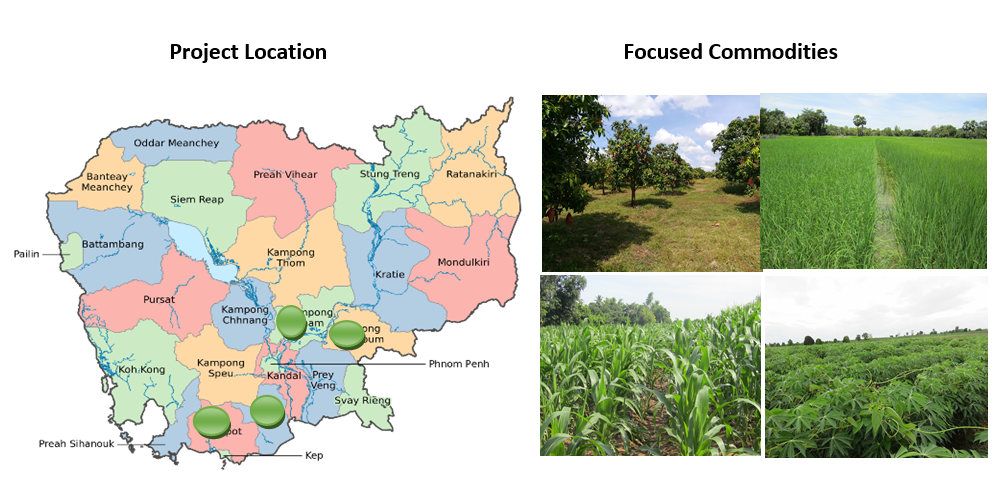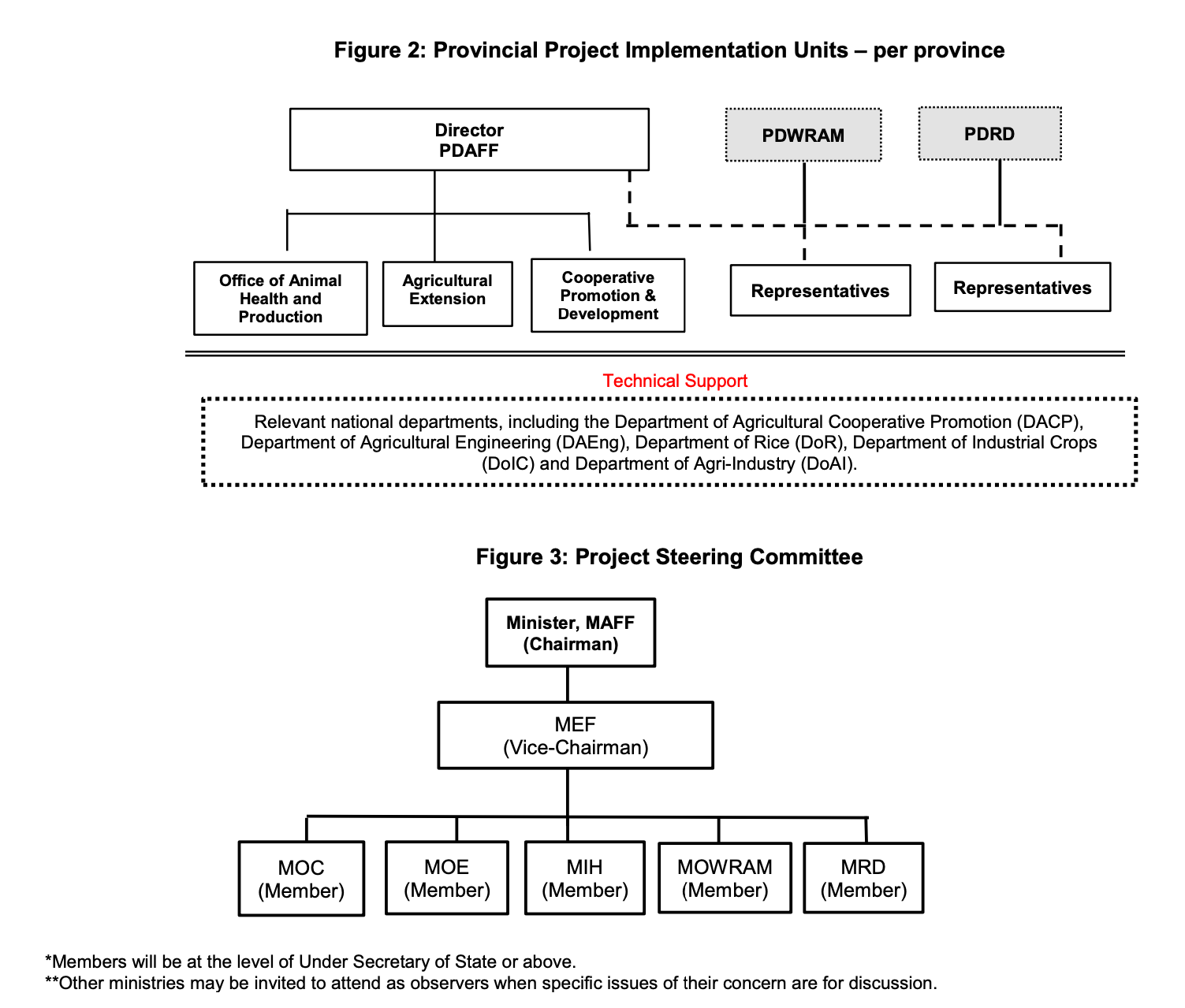Background
Country context
The Kingdom of Cambodia is situated in Southeast Asia with total territory of 181,035 Km². The country is located within the tropical Indomalayan ecozone and the topography consists of low-lying central plains that includes Tonle Sap basin and the Mekong River flood-plains surrounded by mountainous and highland regions, and a lengthy coastline in the South. The population of Cambodia is estimated at 16.3 million1 (census in 2019) and is growing at an average annual rate of 1.46%. Close to 80% of the population live in rural areas and their livelihoods depend on agricultural production. Rural communities in particular are characterized by poverty, hunger and malnutrition, with approximately 90% of the country’s poor households living in the country side². Poverty has been greatly reduced in the past decades but many households remain vulnerable.
Project context
The Climate-Friendly Agribusiness Value Chains (CFAVC) Sector Project supports the implementation of the government’s Agriculture Sector Strategic Development Plan (ASSDP 2014−2018 and new update 2019-2023) and the Industrial Development Policy, (IDP2015−2025). The project aims to improve the competitiveness of agricultural value chains in Kampong Cham and Tboung Khmum provinces along the Greater Mekong Sub-region (GMS) southern economic corridor, and Kampot and Takeo provinces along the south-coastal economic corridor.
The CFAVC project includes ADB-innovations such as improved design standards of rural infrastructure to make it climate resilient and more sustainable, and enhance regional connectivity and trade along the GMS transport corridors. It will make additional funds available to improve climate resilience of economic infrastructure. The project will expand the use of advanced technologies such as laser land levelling, and information and communication technologies (ICT) to improve resource use efficiency and reduce GHG emissions. By providing targeted gender responsive capacity building and policy support to stakeholders along the value chain, the project will enhance crop production and productivity in project areas, diversify livelihood options, especially for poor women, and assist smallholders’ transition from subsistence to commercial agriculture. By improving the testing capacity for quality and safety, the project will significantly enable broader access by project beneficiaries to high-value (export) markets within and beyond the GMS. Using cooperatives as an entry point, the project will foster PPPs and encourage the private sector to invest in input and output markets, and marketing. The project will promote economic integration through harmonization of standards and complement initiatives on trade and agriculture.
The total project cost is estimated at $141.04 million. For the implementation RCG has received (i) concessional loan Nr 3661/CAM of $90 million from ADB’s ordinary capital resources, and (ii) loan Nr. 8346-CAM (EF) of $10 million and (iii) Grant No 0579-CAM (EF) of $30 million from the Green Climate Fund (GCF), while the remainder are financed by the RGF ($ 7,36 million) and the Beneficiaries $ 3,66 million.
The various Project financing agreements were concluded on 6 July 2018 and will terminate, unless extended, on 31 March 2025 with physical completion planned for 31 December 2024.

The project will boost the climate resilience of critical agricultural infrastructure and help commercialize rice, maize, cassava, and mango production. It will help (i) increase crop productivity and diversification; (ii) improve the capacity for storage, processing, and quality and safety testing; and (iii) promote the use of solar and bioenergy. It will strengthen the technical and institutional capacity for climate-smart agriculture (CSA) and create an enabling policy environment for climate-friendly agribusinesses.
Institutional arrangement and Implementation Structure
The Ministry of Agriculture, Forestry and Fisheries (MAFF), in coordination with the Ministry of Water Resources and Meteorology (MOWRAM), and the Ministry of Rural Development (MRD), and their provincial departments are wholly responsible for the implementation of the ADB- financed project, as agreed jointly between the borrower and ADB, and in accordance with the policies and procedures of the government and ADB.
The institutional units of the project implementation consisted of a project steering committee (PSC), a project management unit (PMU), project implementation units (PIUs) within the implementing agencies (IAs) and provincial project implementation units (PPIUs) in each project province.
At national level, MAFF is the Executive Agency (EA), working in close coordination with MoWRAM, and MRD. The General Directorate of Agriculture (GDA), the Cambodia Agricultural Research and Development Institute (CARDI) General Directorate of Animal Health and Production (GDAHP), the General Department Directorate of Technical Affairs of MOWRAM, are the implementing agencies (IAs)
At Provincial level, the provincial departments of agriculture, fisheries and forestry (PDAFFs), provincial departments of water resources and meteorology (PDWRAMs) and provincial departments of rural development (PDRDs) will be the key agencies working with guidance and technical support from relevant national departments. A provincial project implementation unit (PPIU) will be established in each of the four targeted provinces. The PPIU will be chaired by the director of PDAFF, and will comprise representatives of PDWRAM and PDRD, and PDAFF staff related to cooperatives, agricultural extension, and animal health and production. PDWRAMs will be responsible for coordinating all field activities with FWUCs, while PDRDs will be responsible for all farm roads and connectivity to agricultural cooperatives.
Project Impacts and Outcome. The project is planned to deliver the following impact: agricultural competitiveness improved. The impact is reflected in enhanced productivity, climate resilience, quality and safety, value addition and rural household incomes.
The project will have the following outcome: productive and resource efficient agribusiness value chains developed in the project areas.
Project outputs. The project is aligned with the following outputs
Output 1: Critical agribusiness value chain infrastructure improved and made climate resilient. Under this output, 5 key activities involve.
1) Rehabilitation irrigation and water management infrastructure (off-farm irrigation systems, on-farm water rainwater harvesting ponds, and drip irrigation) to climate-resilient condition;
2) Upgrading agricultural cooperatives’ value chain infrastructure (drying, processing and storage facilities);
3) Improving the connectivity of farms to cooperatives and markets through climate-resilient farm road networks;
4) Strengthening the infrastructure for agricultural quality and safety testing; and
5) Promoting renewable energy (bio-digesters, use of solar energy in target cooperative).
Output 2: Climate-smart gender responsive agriculture and agribusiness promoted. Under this output, 4 key activities involve
1) The project will support the Cambodian Agricultural Research and Development Institute to produce, multiply, and distribute climate-resilient varieties of rice and maize and to improve weaning and acclimatization of mango and cassava.
2) The project will train at least 40,000 farmers (of which 16,000 are women) on CSA practices, demonstrate laser land levelling, and construct and upgrade four farm mechanization workshops and four agribusiness training facilities
3) For each gravity irrigation scheme developed Operation and Maintenance capabilities will be establish and strengthening.
4) In the participating provinces agricultural development centers and engineering workshops will be made fully operational
Output 3: Enabling environment for climate-friendly gender responsive agribusiness enhanced. Under this output, 6 key activities involve
1) The project will support the Ministry of Agriculture, Forestry, and Fisheries (MAFF) and the Ministry of Commerce in creating a favorable gender responsive policy environment for agribusiness as well as mobilizing private sector participation through public-private partnerships (PPPs) and contract farming.
2) The project will provide support for farm product certification, quality standards, and resilience capacities
3) Good agricultural practice and organic fertilizer and biofertilizer standards.
4) The project will support cooperatives in becoming sustainable agribusiness ventures by linking up with the private sector and by establishing crop-centric PPP forums.
5) The project will raise financial institutions’ awareness on green finance and the integration of environmental and climate risk screening criteria into credit application and reporting procedures.
6) Using information and communications technology (ICT), the project will provide weather forecasting, market, and agronomic information to create an environment for more effective climate related risk/hazards management.

ORGANISATIONAL STRUCTURE OF CFAVC PROJECT AS WELL AS IMPLEMENTATION AND FUND FLOW ARRAGEMENTS

